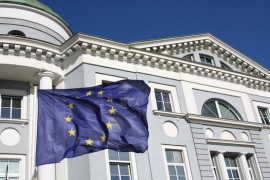BBC bias comes in many forms. One of the most insidious is bias by omission, when the Corporation chooses not to report key developments or perspectives in areas of major controversy.
It is a major issue in the referendum campaign. For example, the Corporation barely touched the story about a poster – ostensibly designed to encourage ethnic minorities to vote – which crassly depicted those who oppose immigration as a bullying skinhead thug.
The reason? Covering the story would have unavoidably opened a can of worms in the ‘remain’ strategy.
Front-line presenters John Humphrys and Nick Robinson have both admitted that such bias has been particularly evident in BBC coverage of the immigration debate. The views of opponents of the unprecedented levels of mass immigration into the UK since 2004 have routinely been ignored by the BBC or, just as bad, dismissed as racism or xenophobia.
It has also applied for decades in the BBC’s general reporting of the EU. Until forced to change by the EU referendum rules, the BBC vastly under-reported the withdrawal perspective, and anything to do with the case against the EU, as Brexit The Movie so vividly confirms. Emphatically, you did not hear those arguments first on the BBC.
Although the BBC is now reluctantly giving the opponents of the EU some airtime, it is mostly through gritted teeth. The default-position is still almost invariably Brussels good, Westminster bad.
Evidence of this? As Andrew Marr illustrated vividly at the weekend ‘remain’ figures such as Sir John Major – who was given a platform to attack viciously his perceived opponents – often get much better treatment than ‘leave’ supporters.
Such negativity to the ‘leave’ case is abundant elsewhere. For example, Today presenters Justin Webb and Mishal Husain filed three-part special reports (from Cornwall and Northern Ireland respectively) about what were said to be the local ‘facts’ in the referendum debate. Both, it turned out, injected a central theme: the cardinal importance of ‘EU money’ to the deprived economies in each area.
Neither bothered to tell the audience in their relentless focus on EU benevolence the simple but vital fact that, in reality, ‘EU money’ is actually from the British taxpayer.
Compounding the glaring omission, Justin Webb seemed conveniently not to know that a recent official report commissioned on behalf of local ratepayers in Cornwall had found that the spending of £500m of this ‘EU money’ had been so questionable and inefficient that, for example, it led to the creation of only 3,300 local jobs at a staggering cost of £150,000 per job.
Such blatant bias by omission by the BBC in the EU’s favour extends heavily into other areas.
Take for example, the reporting of one of Brussels’ latest highly controversial initiatives: to combine with Microsoft and other web giants in rooting out what the European Commission calls ‘hate speech and xenophobia’.
The BBC web story about this enthusiastically declared:
‘Microsoft, YouTube, Twitter and Facebook have pledged to remove hate speech within 24 hours, in support of a code of conduct drafted by the EU. The freshly drafted code aims to limit the viral spread of online abuse on social media. It requires the firms to act quickly when told about hate speech and to do more to help combat illegal and xenophobic content. The firms must also help “educate” users about acceptable behaviour.’
What’s not to like? But hang on. Did no-one in the 8,000-strong BBC newsroom think to check out the potential threats to civil liberty and journalistic freedom involved in such a move? Seemingly not. There’s not a peep about such issues in the web story.
The reality – as the Spiked! Website eloquently explains – is that phrases as vague as ‘hate speech and xenophobia’ and ‘acceptable behaviour’ are a legal nightmare and a lawyer’s paradise. They can be interpreted with deeply sinister intent, and, for example, can be used by the EU to attack and attempt to silence those who disagree with its free movement of people and immigration policies. Indeed, that may be the central agenda here.
The background of this new move also speaks volumes about how undemocratic and insidious the EU is. The loosely-phrased laws against hate speech and xenophobia were first enacted by the European Commission in 2008. Has anyone ever been seriously consulted about them? No.
Yet since then, a vast continent-wide operation has gradually been set up to root these twin perceived evils out, including a European Commission against ‘racism and intolerance’.
The latest initiative with a Microsoft, therefore, is arguably a very substantial intensification of the Commission’s assault on those who disagree with its policies towards free movement, as the reams of explanation in the press release about the development clearly show.
And the BBC accepts this without a murmur. Why? Because, it still instinctively supports the EU, and will publish derogatory views about Brussels only if forced.
In this referendum, the BBC should be grasping every opportunity to explore EU-related issues, and especially the controversy surrounding them. Andrew Marr will call Boris Johnson ‘abominable’ for daring to raise Hitler in connection with EU operations, but he and his colleagues ignore EU actions that are patently and blatantly a threat to our fundamental, hard-won freedoms.
John Wilkes? He will be surely turning in his grave.










